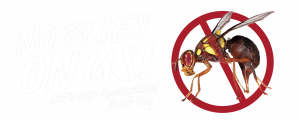Fruit fly is finding it harder to get a foothold in the Goulburn Murray Valley (GMV) thanks to moves to disrupt the pest’s habitat through the removal and eradication of unwanted fruiting trees and plants.
The GMV Fruit Fly Project’s free tree removal program has significantly reduced potential breeding habitat through the removal of nearly 80,000 unmanaged fruit trees and plants since June 2017. It is estimated that by the end of the financial year this number will have increased to over 93,000.
GMV Regional Fruit Fly Coordinator Ross Abberfield said originally the focus was on unmanaged residential and public trees and plants but has been expanded to include unmanaged orchards, which make up a large percentage of the removals to date.
“We have been able to reduce potential breeding habitat by working with property owners to remove unmanaged orchards that have been non-productive for two consecutive seasons or more. These orchards are inspected by Agriculture Victoria staff to verify they meet the strict conditions necessary to qualify for the removal program,” Mr Abberfield said.
The program allows for the removal of unwanted and unmanaged fruit trees in nonproductive orchards to be professionally removed at no cost to the property owner. A similar program facilitates the removal and eradication of unmanaged fruit fly habitat from private residential properties and public lands.
“Every unmanaged fruit fly host tree and plant removed means a permanent reduction of suitable habitat for fruit fly to lay eggs and breed,” Mr Abberfield said.
It only takes one unmanaged fruit tree to provide a potential food source for new generations of fruit fly to flourish in.
“A single female fruit fly can lay up to 800 eggs that can reproduce another generation within 4-6 weeks, so it is very easy for large increases in fruit fly populations to occur very quickly,” Mr Abberfield said.
Increasing fruit fly populations are known as a hotspot and are identified through multiple project trapping grids across the GMV region. Action to reduce these populations must be undertaken immediately to stop the spread of fruit fly to neighbouring properties. “Field Officers are deployed to hotspots as they are identified to assist in combating the spread through increased awareness, education and support, such as our tree removal programs, amongst growers, community and government agencies,” Mr Abberfield said.
Evidence gained from the numerous trapping grids installed throughout the GMV indicate that the project has achieved a 60 per cent reduction in fruit fly numbers across the region and a 73 per cent reduction in QFF numbers in Cobram, where over two million sterile male QFF are dispersed by aircraft each week as part of a trial pilot program.
“The tree removal program is provided free of charge to landholders and has seen the removal of unmanaged fruit trees and plants from orchards, private residences and public areas such as nature strips, roadsides, channel banks and reserves,” Mr Abberfield said.
All tree removal works undertaken as part of the program are carried out by fully insured professional contractors, in consultation with the landholder or responsible authority. The tree removal program is voluntary and designed to assist private and public landholders who cannot manage their fruit trees effectively or growers who have non-productive orchards that they are unable to manage for various reasons.
The free tree removal program is available within Campaspe, Greater Shepparton, Moira and Strathbogie Shires. Anyone who has a fruit tree they no longer want or can no longer manage can contact their participating Council’s customer service center or visit www.gmv-qldfruitfly.com.au for more information about the application process.
Removal of unmanaged fruit fly habitat is only one aspect of the project’s QFF Area Wide Management Action Plan. The GMV Regional Fruit Fly Project aim’s is to create fruit fly awareness, education and engagement in the community, industry and government across a broad region and encourage landholders to accept responsibility for managing their fruit trees and vegetables effectively.
